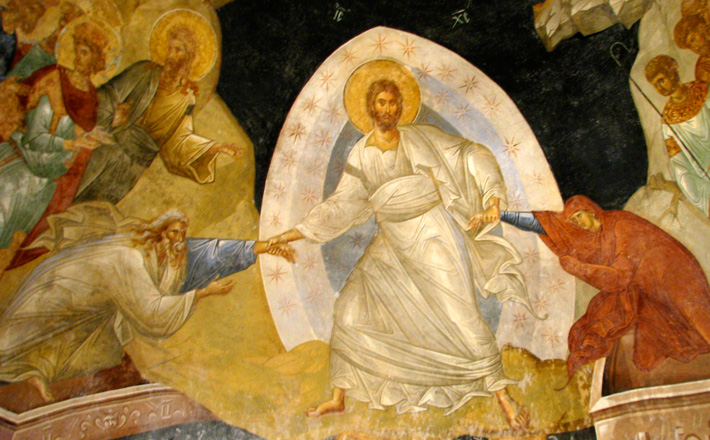Commentary on 2 Thessalonians 2:1-5, 13-17
A worried, upset congregation leaves no one at ease
Once rumors get going of what one leader said, or a special few’s interpretation of how events really transpired, or any other sort of disturbance sweeps through a church causing confusion and fracture, it is difficult and absolutely essential to put them to rest in a decisive manner.
In the case of 2 Thessalonians 2, rumors have spread through this church concerning Paul’s teaching about the end times and these rumors are causing significant distress. The texts chosen here frame the chapter and the discussion in an enlightening way. Rather than becoming distracted by detailed maps of the end times and time frames for the rapture, this frame technique allows us to see Paul’s purpose in the chapter, stated in verses 2 and 15: encouragement that they “not become easily unsettled or alarmed,” but instead that they “stand firm and hold fast to the teachings” he gave them in person.
The term translated by the NIV as “unsettled” has the basic meaning of “shaken,” a violent movement like an earthquake. The shaking can be figurative, such as in Matt. 24:29, where the hosts of heaven will be deposed and all will be overturned, or more literally, as in the simile of Rev. 6:13 of figs falling from the tree when “shaken” by a strong wind. It may be worth noting that Tacitus described AD 51, around the time of this letter, as an “ominous” year filled with earthquakes. They knew what it was to be “shaken.” What is occurring in this church is not a mild questioning about how things might work out but an earthquake of theological doubt that is leaving vast destruction in its wake. Likewise, the word for being “alarmed” is the fear caused by surprise. Having begun in one direction based on the teaching of Paul while he was with them, they have been surprised by this new teaching and their fear is that of having had their foundation pulled out from underneath them. They are paralyzed, scared, uncertain what to believe and, from that, how to act.
This new teaching about the end times may not seem all that concerning to those of us who have been waiting for Christ’s return for 2000 years and have heard many explanations, but for this young congregation, this new teaching has shaken them and left each person trying to figure out how they ought to act: should they work or should they wait? Should they provide for those who aren’t working or should they make them work? Have they already been perfected, and if so, why does everything appear to be the same, themselves included? Paul does spend some time attempting to correct the teaching that had gone so clearly wrong, but the significance of this frame is that he spends more time and effort encouraging this congregation to not fear and to stand firm.
And this makes me wonder at how churches generally handle teaching about the end times. For some churches and preachers, it becomes a fascination bordering on an obsession, but the teaching of “escape” through the rapture leaves people paralyzed about how they ought to live in the world now while they wait. In a sense, life can become a mere holding cell, a waiting pattern till they can escape and go to heaven. But Paul’s focus is to remind them instead of all the things that need to happen first, so they ought to trust God and continue on doing good rather than obsessing about the end.
On the other hand, Paul didn’t avoid teaching about the end, for to him it was a source of encouragement. As he taught the Thessalonians, there is and there will be greater and greater opposition and persecution, but Christians do not need to live in fear! Much of the rhetoric in circles obsessed with end times prophecies is dominated by fear of what is going on now, and much of the rhetoric in circles that avoid discussing the end times is dominated by what we have to do by our own efforts. For Paul, all is grace. Christians can be confident, encouraged people because we know that we are held as first fruits by God’s choice, preserved through the Spirit. In Paul’s paradigm there is neither room for pride in our efforts to improve the world, nor despair at the state of the world around us. For Paul, all of this talk about the end is to encourage us in our security in Christ and draw us ever further in the Spirit’s sanctifying work. 2 Thessalonians 2:13 is a brilliantly Trinitarian verse of encouragement to this end, and that, it seems to me, is Paul’s greater emphasis. No matter how strong the opposition, we are secure in the Trinity, set free to live according to the Spirit’s sanctifying work.
Ultimately, it is the prayer in 2:16 and 17 that should receive the most attention from the preacher or teacher, as it resonates with the consistent prayer of Paul: a focus on the love and grace of God in Christ, which encourages us in hope and strengthens us in every good deed and word. This sort of prayer functions as benediction, encouragement, and inspiration. The holistic picture of “every good deed and word” sums up the entirety of life lived: thoughts, emotions, and actions, all brought forth by the strengthening of the Spirit through the encouragement of the love of God. Paul’s confidence in them rests not in them but in the God they all worship, and to that end he encourages them not to be shaken or startled out of this confidence, but instead to grow in faithfulness.


November 10, 2013